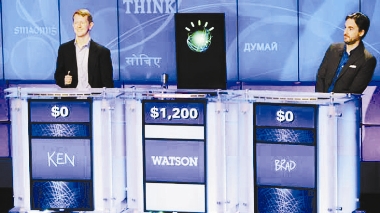 Machines first out-calculated us in simple math. Then they replaced us on the assembly lines, explored places we couldn’t get to, even beat our champions at chess. Now a computer called Watson has bested our best at Jeopardy. A gigantic* computer created by IBM specifically to excel at answers-and-questions left two champs of the TV game show in its silicon dust after a three-day tournament*, a feat that experts call a technological breakthrough. Watson earned US$77,147, versus US$24,000 for Ken Jennings and US$21,600 for Brad Rutter. Jennings took it in stride, writing: “I for one welcome our new computer overlords” alongside his correct Final Jeopardy answer. The next step for the IBM machine and its programers: taking its mastery of the arcane* and applying it to help doctors plow through blizzards* of medical information. Watson could also help make Internet searches far more like a conversation than the hit-or-miss things they are now. Paul Saffo, a longtime Silicon Valley forecaster, and others, see better search engines as the benefit from the Jeopardy-playing machine. “We are headed toward a world where you are going to have a conversation with a machine,” Saffo said. “Within five to 10 years, we’ll look back and roll our eyes at the idea that search queries were a string of answers and not conversations.” The beneficiaries* could include technical support centers, hospitals, hedge funds or other businesses that need to make lots of decisions that rely on lots of data. For example, a medical center might use the software to better diagnose disease. Since a patient’s symptoms can generate many possibilities, the advantage of a Watson-type program would be its ability to scan the medical literature faster than a human could and suggest the most likely result. (SD-Agencies) | 
